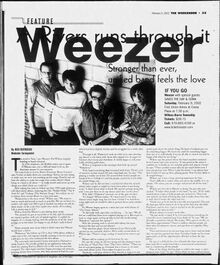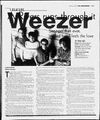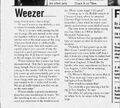The Weekender interview with Pat Wilson - February 6, 2002
| Print interview with Patrick Wilson | |
|---|---|
 | |
| Publication | The Weekender |
| Published | February 6, 2002 |
| Interviewer | Rex Rutkoski |
| Interviewee | Patrick Wilson |
| Title | A Rivers runs through it |
| Format | |
| External link | Archived on Newspapers.com |
| References | See where this article is referenced on Weezerpedia |
Article also published in The Philadelphia Inquirer
|
A Rivers runs through it
The word is "love," says Weezer's Pat Wilson, happily heading to band rehearsal. As if for emphasis, the Buffalo native says it again. If Weezer once was a difficult band to be in, the drummer assures it's not anymore. "It's a joy to be in it now. Rivers (frontman Rivers Cuomo) says, 'Come on dude, show me something.' Before, he was trying to make sure we were not screwing up his songs. Now he sees we have the ability to make his songs even cooler, which I think being in a band is all about — to really stretch and come up with things you didn't think you could do." After taking five years to follow-up their 1994 triple-platinum self-titled debut album, featuring hits like "Buddy Holly," "Say It Ain't So" and "Undone (The Sweater Song)," the rockers are set to release their second album in a two-year span. "Productivity is the buzz word," Wilson says. "We want to tour as much and record as much as possible. We are on kind of a creative roll right now. We've got it worked out where we will do three weeks on the road, then maybe four weeks off recording. Life is pretty easy in LA." Wilson feels like Weezer is just hitting their stride. "I'm amazed we got as successful as we did, and I'm amazed we stayed together, well, sort of stayed together. I couldn't be happier. It's a strange feeling, with the publicity of all the weird goings-on in the band. I'm happy to say all that's really behind us." There certainly were times when it didn't seem that Weezer would have a future. Pinkerton, the follow-up CD to their 1994 debut, stiffed at radio and at the cash register, initially seeming to be too much of a left turn for fans who embraced the first album. The mercurial, introverted Cuomo retreated to Harvard to study English. He actually picked up an application when the band was playing Boston, filled it out on the tour bus and was accepted. The other band members began pursuing solo projects, growing distant from Cuomo, who they seemed to find too controlling. Cuomo underwent an operation to lengthen one of his legs, which had been slightly shorter, and he struggled for a while after that. Through it all, Pinkerton took on a life of its own, developing almost a cult status with those who tapped into its angst via Internet chat rooms and elsewhere. It slowly began to sell, eventually attaining gold status. Wilson is surprised at the mystique that built up around Pinkerton. "Kids heard something that resonated with them. There's a lot of emotion on that record. It's just a big freak out," he says. "The playing is totally out of line. I'm amazed that (some) people are fanatical for it. I think it's cool the people carried the torch while we sorted things out. "The Internet was huge for that. It's unbelievable. We're just scratching the surface of what it will be like when they see the true value of it. Things will start getting amazing. I think the Internet is the greatest one-to-one communication you can have. It's amazing." Wilson says he did not have a real feel for what the record's artistic value might or might not have been when it was being made. "I didn't know what to think. We weren't getting along that well. I was just there to do my drums and I was out the door." Why didn't Pinkerton resonate out of the gate for fans? "It's sloppy," Wilson replies. "It's weird and it's too slow. Almost every single song was too slow. I think if we had those songs right now we would be able to present them more convincingly." So, Weezer began again in a sense last year with release of The Green Album. "It did really well, especially considering," he says. "We all feel we could have been more inspired playing on it. But it got us back on stage again, setting up this record (the forthcoming Maladroit, expected this spring')." Why the seeming rush to record after taking five years between the first and second albums? "Our new bass player (Scott Schriner from Ohio) really opened up our ensemble abilities. We're really excited about it," Wilson says. "There's a huge catalog of material we want to get to." Weezer will be making up for lost time, he says. He says the songs are all very strong and the playing is more in the line of "Hash Pipe" from The Green Album. "There are lots of cool parts going on. Everyone has a chance to do some neat stuff, which is fun. That makes for great records. "Anybody could play whatever they wanted as long as it was happening. That's all I need to hear. It's really fun. Rivers was pretty great about the whole thing. He kind of realized you can do something bigger. We knew we could do something bigger than any of us individually if we are all able to stretch out and be happy with what we are doing." Wilson says the period where the band members retreated from Cuomo had some positives. "It was good, in the sense it enabled me to finally go out and play guitar and sing in a band," he says. "That's another reason why we are much better now. I have perspective now. When I play the drums I can almost hear how it feels if I was up there playing guitar. Now I'm less likely to do stupid things." Wilson says it was a huge growing experience for him. That's difficult to realize when you are in the middle of it, he admits. "Of course, you are younger and pissed off all the time," he says. Wilson sees his role in Weezer as being "the guy who gets excited." "It helps other people in the band," he says. "If I'm really excited about a take, it helps people get excited too. They look over and see me kind of having fun, and it makes them have fun as well. And it works the other way too.
Wilson admires Cuomo's work ethic. "He just works so hard. If he is focused doing something, he is just the most committed guy I can think of," he says. "We are all really committed, I think. We realize, 'Who gets to do this, to have these opportunities?' There's a million talented people out there who, for whatever reason, can't get their act together. Plus, we love it. "First and foremost we are just huge music lovers and we don't take our past for granted any more. Everyday I wake up I'm more appreciative of all the opportunities afforded us than the day before." He says it is difficult for a lot of bands who have success in their early 20s to understand what a monumental achievement that is, considering all the pitfalls. "One of the things that has kept us valid is the music is interesting at some level," he says. "(Even when he was confused about the band's future) I was old enough to know that it is worth being around music that is deep." He says Cuomo is a workaholic, a trait to which he readily identifies. "He is so in tune with cutting the fat out of songs. He gets turned on by songs put together without a seed. I am too. It satisfies sort of the head space of the song when you think about it intellectually. When you couple that with excited and capable players you can sort of take the song into a great performance and cool recording too. It all kind of comes together. It's all magic. It's just magic." Wilson believes that Cuomo has been misunderstood. "But that's just part of his thing though. He is not especially forthcoming to the media. Half the time some jerk comes up and immediately gets in his face about something. Nobody handles those things with any grace. I think all he ever wanted to do is make cool records. We are all really excited now that we are on the same page." Wilson exudes a general excitement about his own involvement in music. "It's like breathing to me, a chance to transcend my awareness of the world around me. Music is just magic if it's good." Growing up in the Buffalo suburb of Clarence Center, where he attended Clarence High School, he says he can't remember a time when he wasn't completely excited about some kind of music. The first show he remembers seeing was Van Halen in 1984 at Buffalo's Memorial Auditorium. He also recalls an early Love and Rockets show at the University of Rochester. He feels hometown residents have been supportive of him. Wilson believes that geography did have an impact on who he became as a musician. "Probably if I had grown up on the West Coast I would have learned and appreciated a lot more indie stuff than I did. It took me a long time to realize how cool a lot of these older bands were and stuff from England. A band like the Smiths, who were mainstream out here in Los Angeles, I didn't know anything about in Buffalo." On Weezer's Website he wrote that in '94, "Four years ago I was a guy with a bad haircut from Buffalo." How would he update that? "I'm currently a guy wearing a hat living in Los Angeles," he says. But when he's playing music, no matter where he is, he seems to be living large. "I'm just happy to be here. I have a lot of love for music and want to make the most of my time here on this planet for sure," he says. He plans to release an album with his side band, Special Goodness. "What I want to achieve with them is sort of the classic rock band: 'Here's what these guys sound like,' rather than 'Here's what they sound like with everyone playing his ideas.' "Now that Weezer does that it's double the pleasure. Both bands are sort of doing what I wanted." Wilson says that Weezer feels like an entirely new band to him. "Weezer's music is just honest and we are not trying to do anything other than be ourselves, which is cool," he adds. "I'm pretty much the exact same person no matter what situation I am in. I think we all are. I think it's just we are accessible.We are just more like average people. There are a lot of average people out there I think." |
Gallery
| More Patrick Wilson interviews from 2002: | |
|---|---|
| Other band member interviews from this year: | |
| Other material from The Weekender: | |
| Other archives: | |


